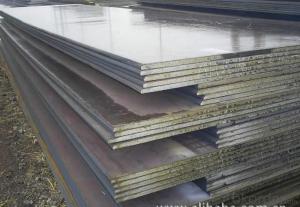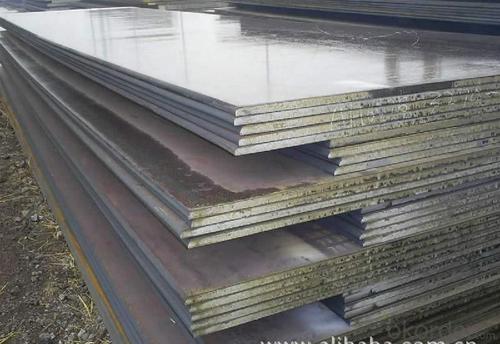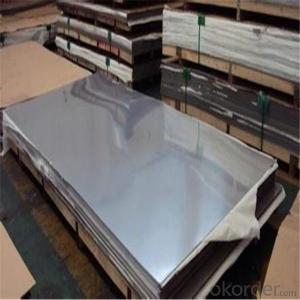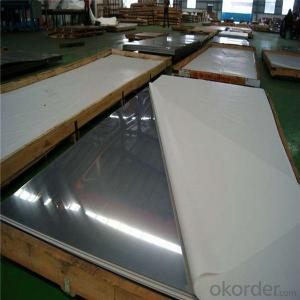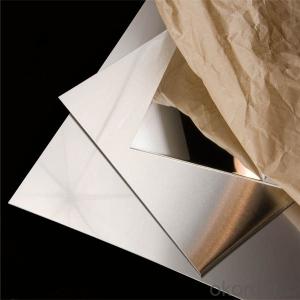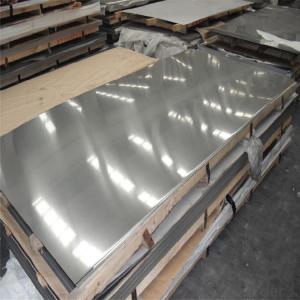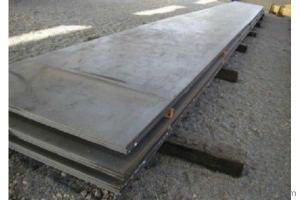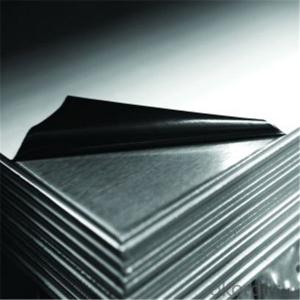Cold Rolled 2B 304 Stainless Steel Metal Sheet Price
- Loading Port:
- Tianjin
- Payment Terms:
- TT OR LC
- Min Order Qty:
- 3 m.t.
- Supply Capability:
- 100000 m.t./month
OKorder Service Pledge
OKorder Financial Service
You Might Also Like
Specification
Cold Rolled 2B 304 Stainless Steel Metal Sheet Price
Detailed Information of Cold Rolled 2B 304 Stainless Steel Metal Sheet Price
| C | Si | P | S | yield Strength MAp | Tensile strength MAp | Elongation % | ||
| A36 | 0.24 | 0.4 | 0.045 | 0.03 | 250 | 400-520 | 26 | |
| C | Si | Mn | P | S | Cu | |||
| A283 | ≤0.27 | 0.15-0.4 | ≤0.9 | ≤0.035 | ≤0.04 | ≥0.2 | ||
| Thickness: | 6mm, 8mm, 12mm, 16mm, 20mm, 25mm, 30mm, 50mm, 80mm, 100mm, 150mm, 200mm | |||||||
| Width: | 1500mm, 1800mm, 2000mm, 2200mm, 2500mm | |||||||
| Length: | 6000mm, 8000m, can cut to width and length | |||||||
| Packing Details; | according to customer‘s require or export’s standard | |||||||
| Delivery time; | 7 days for stock sizes, 20-25 days for new production sizes | |||||||
| Port: | Tianjin China | |||||||
Related Products Overviews of Cold Rolled 2B 304 Stainless Steel Metal Sheet Price
Product Name | Typical Grades | Diameter(mm) | Standard Adopted |
Carbon Steel | 20 (1020/S20C/C22) |
Ø16-Ø300 |
GB/SAE/ JIS/DIN |
40 (1040/S40C/C40) | |||
45 (1045/S45C/C45) | |||
Bearing Steel | GCr9 (51100/SUJ1) |
Ø12-Ø250 | |
GCr15 (52100/SUJ2/100Gr6) | |||
GCr9SiMn (A485-Gr.1/SUJ3) | |||
Cr-Mo Steel | 20Cr (5120/SCr420H/20Cr4) |
Ø12-Ø250 | |
40Cr (5140/SCr440/41Cr4) | |||
42CrMo(4140/SCM440/42CrMo4) | |||
Gear Steel | 20CrNiMo |
Ø16-Ø600 | |
20CrMn(5115/SMnC420/20MnCr5) | |||
20CrNiMo(8620/SNCM220/20CrMiMo2) |
Related Products Application of Cold Rolled 2B 304 Stainless Steel Metal Sheet Price
Carbon Steel | l Mold bottom l Plastic mold l Construction machinery parts l Automobile parts l Security grills l Screens l Construction |
Bearing Steel | l Aerospace l Navigation l Nuclear energy l Chemical industry l Electronic information l Petrochemical l Instrument and meter l Transportation |
Cr-Mo Steel | l Mechanism & Fasteners gear l Stressed components for vehicles l Engines and machines l Parts of larger cross-section |
Gear Steel | l All kinds of gears l Statically and dynamically stressed component for vehicles l Engines and machine l Larger cross-section parts l Crankshafts |
Company Introduction of Cold Rolled 2B 304 Stainless Steel Metal Sheet Price
CNBM International Corporation is the most import and export platform of CNBM group(China National Building Material Group Corporation) ,which is a state-owned enterprise, ranked in 270th of Fortune Global 500 in 2015.
With its advantages, CNBM International are mainly concentrate on Cement, Glass, Iron and Steel, Ceramics industries and devotes herself for supplying high quality series of refractories as well as technical consultancies and logistics solution.
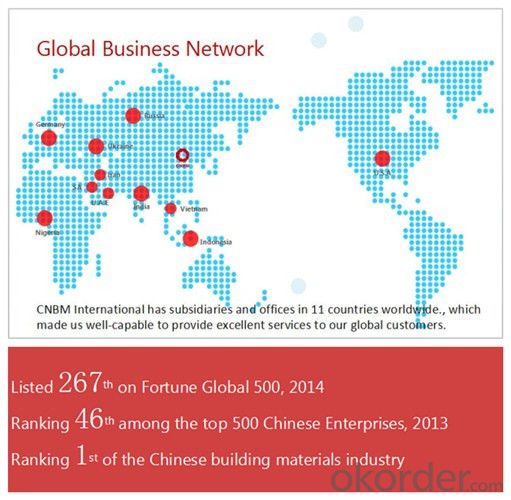
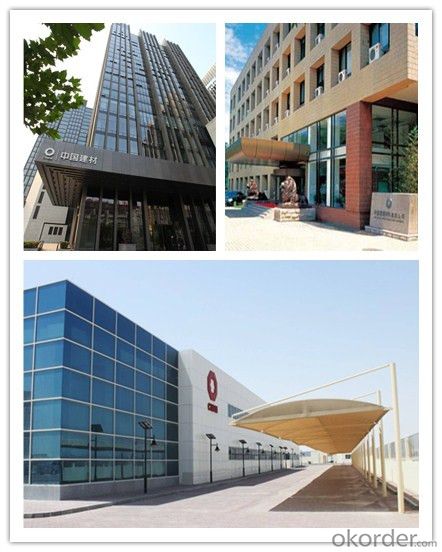
After-sale service | l CNBM provides the services and support you need for every step of our cooperation. We’re the business partners you can trust; you can relax and get on with doing business. l For any problem, please kindly contact us at any your convenient time, we’ll reply you in our first priority within 24 hours
|
Advantages
| l Industry experience over 20 years. l Shipment of goods -More than 70 countries worldwide. l The most convenient transport and prompt delivery. l Competitive price with best service. l High technical production line with top quality products. l High reputation based on best quality products.
|
Packaging & Delivery of Cold Rolled 2B 304 Stainless Steel Metal Sheet Price
Packaging Detail | Sea worthy packing /as per customer's packing instruction |
Delivery Detail | 15 ~ 40 days after receiving the deposit |
Products Show
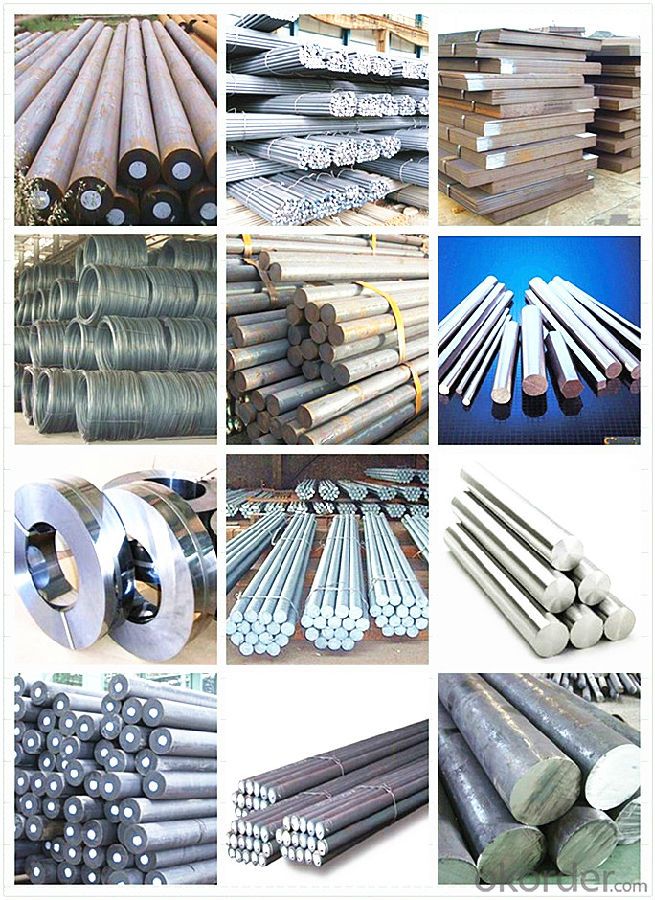
FAQ:
Are you a trading company or manufacturer? | Manufacturer |
What’s the MOQ? | 3 metric ton |
What’s your delivery time? | 15-35 days after downpayment received |
Do you Accept OEM service? | Yes |
what’s your delivery terms? | FOB/CFR/CIF |
What's the Payment Terms? | 30% as deposit,70% before shipment by T/T |
Western Union acceptable for small amount. | |
L/C acceptable for large amount. | |
Scrow ,Paybal,Alipay are also ok | |
Why choose us? | Chose happens because of quality, then price, We can give you both. Additionally, we can also offer professional products inquiry, products knowledge train (for agents), smooth goods delivery, excellent customer solution proposals. |
What's your available port of Shipment? | Main Port, China |
What’s your featured services? | Our service formula: good quality+ good price+ good service=customer's trust
|
Where are your Market? | Covering more than 160 countries in the world |
- Q: How does special steel contribute to the automotive suspension spring industry?
- Special steel plays a crucial role in the automotive suspension spring industry by providing enhanced performance and durability to the springs used in vehicles. Suspension springs are responsible for supporting the weight of the vehicle and absorbing road shocks, ensuring a comfortable and smooth ride for passengers. Special steel, also known as alloy steel, is specifically designed to possess exceptional mechanical properties, such as high strength, toughness, and resistance to wear and fatigue. These properties are essential for suspension springs, as they need to withstand the constant stresses and strains experienced during vehicle operation. The use of special steel in automotive suspension springs allows for the production of springs that are lighter in weight, yet stronger and more reliable compared to traditional steel springs. This results in improved fuel efficiency and reduced vehicle weight, contributing to lower emissions and a more sustainable automotive industry. Furthermore, special steel enables suspension springs to maintain their shape and performance over an extended period, even under extreme conditions. This ensures that the vehicle's suspension system remains effective, providing a comfortable and stable driving experience. In addition, special steel can be tailored to meet specific requirements of different vehicles, allowing for the customization of suspension springs based on factors such as vehicle weight, load capacity, and desired ride quality. This flexibility in material properties enhances the overall performance and safety of the suspension system. Overall, special steel plays a vital role in the automotive suspension spring industry by providing the necessary strength, durability, and performance characteristics required for a reliable and efficient suspension system. Its use contributes to the development of lighter, more fuel-efficient vehicles, while ensuring passenger comfort and safety.
- Q: What are the typical mechanical properties of special steel?
- The typical mechanical properties of special steel can vary depending on the specific grade and composition. However, some common characteristics include high tensile strength, good ductility, excellent hardness, and resistance to wear and corrosion. Special steels often exhibit superior toughness, heat resistance, and high fatigue strength, making them suitable for demanding applications in industries such as aerospace, automotive, and construction.
- Q: What are the factors that affect the fatigue strength of special steel?
- The factors that affect the fatigue strength of special steel include the composition of the steel, the heat treatment process used, the presence of impurities or defects, the surface finish, the loading conditions, and the operating environment.
- Q: What are the properties of corrosion-resistant steel?
- Corrosion-resistant steel, also known as stainless steel, possesses several key properties. Firstly, it has a high resistance to corrosion, making it suitable for use in environments with exposure to moisture or corrosive substances. Secondly, it contains a minimum of 10.5% chromium, which forms a protective layer called chromium oxide on the surface, preventing further corrosion. Additionally, it has a strong resistance to staining, which makes it easy to clean and maintain. Moreover, corrosion-resistant steel exhibits excellent strength and durability, making it suitable for a wide range of applications in various industries.
- Q: Can special steel be used for precision instruments?
- Yes, special steel can be used for precision instruments. Special steel, known for its high strength, durability, and resistance to corrosion, is often used in the manufacturing of precision instruments such as surgical tools, watches, measuring devices, and scientific equipment. Its unique properties allow for precise and accurate performance, making it an ideal material choice for precision instruments.
- Q: What are the challenges in machining high-speed special steel?
- Several challenges arise when machining high-speed special steel due to its unique properties and characteristics. Its extreme hardness presents one of the main obstacles, making cutting and shaping difficult. High-speed special steel typically has a high carbon content and undergoes heat treatment to enhance its hardness, resulting in increased wear on cutting tools. The increased hardness of this steel also leads to elevated heat generation during the machining process. This heat can cause thermal distortion and impact the dimensional accuracy of the final product. To counteract this, specialized cooling techniques and cutting tools with advanced coatings must be used to dissipate heat and maintain stability. Another challenge is the brittleness of high-speed special steel. It tends to have low toughness and is susceptible to cracking and chipping during machining operations. To minimize the risk of tool failure and excessive stress, careful selection of cutting parameters such as cutting speed, feed rate, and depth of cut is necessary. Furthermore, high-speed special steel often contains alloying elements like tungsten, vanadium, and cobalt, which can further complicate the machining process. While these elements increase the strength and wear resistance of the steel, they also make it more challenging to machine. Effective machining of these alloys and achieving desired surface finishes requires specialized tool materials and cutting strategies. Additionally, the cost of high-speed special steel is often significantly higher than that of conventional steels, adding to the challenges of machining. The high tooling costs associated with the cutting tools required for machining this steel can be a substantial investment. Overall, machining high-speed special steel necessitates advanced cutting techniques, specialized tooling, and careful consideration of cutting parameters to overcome the challenges posed by its extreme hardness, brittleness, and alloying elements.
- Q: What are the main characteristics of wear-resistant castings?
- Wear-resistant castings are specifically designed to withstand the harsh conditions of wear and abrasion. The main characteristics of these castings include: 1. Hardness: Wear-resistant castings are made from materials that have a high hardness rating. This allows them to resist deformation, surface damage, and wear caused by friction and impact. 2. Toughness: In addition to being hard, wear-resistant castings also possess high toughness. This means they can absorb energy without fracturing or breaking, ensuring their longevity and durability in challenging environments. 3. Corrosion resistance: Wear-resistant castings are often resistant to corrosion and oxidation, which helps to extend their lifespan and maintain their performance even in corrosive or high-temperature conditions. 4. Heat resistance: These castings can withstand high temperatures without losing their hardness or strength, making them suitable for applications where heat is generated or transferred, such as in industrial machinery or power plants. 5. Wear resistance: As the name suggests, the primary characteristic of wear-resistant castings is their ability to resist wear. They are designed to minimize the loss of material due to abrasion, erosion, or friction, ensuring a longer lifespan and reduced maintenance requirements. 6. Customizability: Wear-resistant castings can be customized to suit specific applications and requirements. They can be produced in various shapes, sizes, and configurations to fit different components and machinery, providing tailored solutions for wear-related challenges. Overall, the main characteristics of wear-resistant castings make them essential components in industries where wear and abrasion are prevalent, such as mining, construction, cement, and steel manufacturing. These castings help to increase the lifespan and reliability of equipment, reduce downtime, and improve overall operational efficiency.
- Q: How does special steel perform in high-temperature oxidation resistance?
- Special steel is specifically engineered to possess exceptional resistance to oxidation at high temperatures. This kind of steel incorporates alloying components like chromium, aluminum, and silicon, which generate a protective layer of oxide on the surface when subjected to extreme heat. This oxide layer acts as a barrier, preventing further oxidation and corrosion of the steel. The capacity of special steel to withstand high-temperature oxidation is of utmost importance in scenarios where the material is exposed to intense heat and oxidation, for instance, in gas turbines, heat exchangers, and furnaces. The protective oxide layer aids in preserving the strength and integrity of the steel, even under rigorous conditions. Moreover, special steel also showcases remarkable resistance to creep at high temperatures. Creep refers to the gradual distortion of a material under a consistent load and elevated temperatures. The distinctive composition of special steel grants it the ability to resist creep deformation, thereby enhancing its overall performance and dependability in environments with high temperatures. In conclusion, special steel exhibits exceptional performance in terms of resistance to high-temperature oxidation due to its alloying elements and the formation of a protective oxide layer. Its capability to resist oxidation and maintain its structural integrity at elevated temperatures makes it the preferred choice for numerous industrial applications.
- Q: How does special steel contribute to the manufacturing of defense equipment?
- Special steel plays a crucial role in the manufacturing of defense equipment due to its unique properties and characteristics. Firstly, special steel is known for its exceptional strength and durability, making it ideal for constructing various components of defense equipment. This high strength allows for the production of lightweight yet robust structures, enabling the development of advanced weaponry and protective gear. Moreover, special steel possesses excellent resistance to corrosion and wear, making it resistant to the harsh conditions faced by defense equipment in various environments. This resistance to corrosion ensures that the equipment remains functional and reliable even in extreme conditions, such as exposure to saltwater or acidic environments. Additionally, special steel offers exceptional heat resistance, which is crucial for defense equipment such as missile casings or jet engine components. Its ability to withstand high temperatures without losing its integrity or mechanical properties allows for the creation of more efficient and powerful defense systems. Furthermore, special steel can be tailored to meet specific requirements, enabling the manufacturing of customized defense equipment. It can be alloyed with various elements to enhance specific characteristics, such as increased hardness, improved magnetic properties, or better resistance to impact. This versatility allows for the production of defense equipment that meets the exact needs of military applications, enhancing their overall performance. In summary, special steel contributes significantly to the manufacturing of defense equipment by providing exceptional strength, resistance to corrosion and wear, heat resistance, and customization options. These properties enable the creation of more advanced, reliable, and efficient defense systems that meet the demanding requirements of modern military operations.
- Q: Can special steel be used in the manufacturing of precision instruments?
- Indeed, precision instruments can benefit from the utilization of special steel. Special steel encompasses a range of steel types that have been purposefully crafted and processed to possess specific attributes, such as heightened strength, hardness, resistance to corrosion, and thermal stability. These unique qualities render special steel highly suitable for applications necessitating precision and accuracy, such as precision instrument manufacturing. Precision instruments, such as surgical tools, measuring devices, optical instruments, and scientific equipment, necessitate materials capable of retaining dimensional stability and enduring extreme conditions. Special steels, such as stainless steel, tool steel, and high-speed steel, provide exceptional mechanical properties, including remarkable tensile strength, resistance to wear, and dimensional stability. Consequently, these kinds of steel are well-suited for the production of precision instruments. Moreover, special steel can be engineered to possess specific characteristics, such as low magnetic permeability or excellent resistance to temperature fluctuations. These attributes prove particularly vital in precision instruments, as magnetic interference or temperature variations have the potential to impact their performance. To summarize, special steel can indeed be employed in the manufacturing of precision instruments due to its exceptional mechanical properties, dimensional stability, and ability to withstand harsh conditions. Its versatility enables the production of precision instruments of superior quality, fulfilling the stringent requirements of various industries, including the medical, scientific, and engineering sectors.
Send your message to us
Cold Rolled 2B 304 Stainless Steel Metal Sheet Price
- Loading Port:
- Tianjin
- Payment Terms:
- TT OR LC
- Min Order Qty:
- 3 m.t.
- Supply Capability:
- 100000 m.t./month
OKorder Service Pledge
OKorder Financial Service
Similar products
Hot products
Hot Searches
Related keywords
